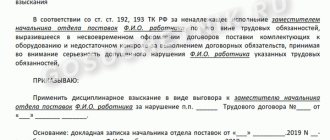When the conflict between an employee and an employer enters an acute phase, you can hear a promise to formalize dismissal for an obstinate specialist for failure to fulfill official duties. How easily the manager can cope with the task will depend on the correctness of drawing up personnel documents.
Basic provisions
Important! Please keep in mind that:
- Each case is unique and individual.
- A thorough study of the issue does not always guarantee a positive outcome. It depends on many factors.
To get the most detailed advice on your issue, you just need to choose any of the options offered:
- Request a consultation via the form.
- Use the online chat in the lower corner of the screen.
- Call: Moscow region: +7 (499) 938-42-57
- Leningrad region: +7 (812) 467-32-98
- Federal number: +7 (800) 350-83-26
Payment at the initiative of the employer is one of the most complex procedures in labor law. It is not for nothing that Article 81 of the Labor Code of the Russian Federation contains 14 points listing the grounds for terminating a contract with an employee without his consent.
Dismissal of an employee for failure to fulfill official duties, if you follow clause 5 of Art. 81 of the Labor Code, is possible only if there is at least one penalty applied to the employee no later than a year ago, Art. 194 Labor Code of the Russian Federation. There may be more such orders in relation to a candidate for payment, since the law does not oblige the employer to apply the most severe punishment immediately, but only gives him such a right, Art. 192 Labor Code of the Russian Federation.
Job responsibilities may be contained not only in instructions, but also in a collective agreement, internal labor regulations or regulations on labor discipline, Art. 68 Labor Code of the Russian Federation.
Collection
The employer is not obliged to dismiss the violator of labor discipline as a primary enforcement measure. A common form of punishment for the guilty employee is a reprimand or warning.
This method of influence makes it possible to stimulate the fulfillment of duties, while the employer has leverage, since the next stage will be the termination of the employment contract on the initiative of the head of the enterprise with the entry of information into the work book.
An employee fired “under article” spoils the work history, which will subsequently affect the opportunity to get a well-paid job.
An employer cannot bring an employee to disciplinary liability based on internal beliefs or personal hostility towards a specific person. Each fact of violation must be properly documented based on the results of an internal investigation as part of a commission created by order.
In case of disagreement with a disciplinary sanction, the employee has the right to appeal to the labor inspectorate, and if the employee was dismissed, the law provides the opportunity to go to court to protect his own interests.
What may be the grounds for dismissal?
When applying for a job, each employee, even before signing an employment contract, must be familiar with the job description, Art. 68 Labor Code of the Russian Federation. However, this does not mean that the responsibilities of the new employee are limited only to this paper and there cannot be legal claims against him for other reasons. Based on the norms of Art. 21 of the Labor Code of the Russian Federation, the reason for dismissal under the article for failure to fulfill official duties, if this happens repeatedly and intentionally (clause 5 of Article 81 of the Labor Code) can be:
| Type of offense | Justification for dismissal |
| Failure to perform labor functions | In addition to recording the fact of shortcomings on the part of the employee, you need to take care of evidence that he did it consciously and without reasons justifying his behavior. |
| Failure to comply with internal regulations and labor discipline | Regular tardiness or unexplained absences can be associated with failure to perform work duties throughout the working day. It will not be possible to hold accountable those specialists who have an irregular schedule. It is important to remember that in the event of dismissal for two short-term delays, the court will consider it an excessive punishment and will reinstate the employee to his position. |
| Failure to meet production standards or planned targets | It will not be difficult to complete a settlement at the initiative of the employer, provided that systematic shortcomings occur due to the fault of the employee, and not for reasons beyond his control. |
| Violation of labor safety rules | Typically, this responsibility is specified in the employment contract or job description, so deliberate disregard for safety can cost your job. |
| Damage to the company, property or reputation | Any type of disciplinary sanction for the harm caused can be imposed on an employee only based on the results of an investigation and irrefutable evidence of his guilt. In addition, it is necessary to prove that material assets were transferred to the employee in the proper manner, or he was warned of responsibility for disclosing certain information about the activities of the enterprise. |
It may seem to some that a specialist risks being fired only if he does not adhere to the job description. This is far from true, because the Labor Code obliges workers to comply with the requirements of all local acts of the company, which they were familiarized with in writing.
Order of dismissal under article for failure to fulfill official duties
This dismissal document is issued if the employee performed his duties in bad faith. It is drawn up and filled out in accordance with Art. 72 Labor Code of the Russian Federation.
This is important to know: Dismissal to care for a sick relative
The document form consists of:
- information about the employer, his place of residence;
- duration of work with the worker;
- information about the mercenary;
- worker status.
It should be accompanied by data from previously collected memos and statements explaining the fact of a violation of the working relationship.
The order must indicate the reason for termination of the work contract according to the lists in the Labor Code:
Employee statement, memo, medical report
| Order | |||
| Full name of the employee | Personnel Number | ||
| Structural subdivision | |||
| Position, rank, class, qualification | |||
| Grounds for termination of an employment contract | |||
| Basis (document, number, date) | |||
| Head of the organization | Job title | Personal signature | Full name |
| The employee is familiar with the order | Personal signature | date | |
| Reasoned opinion of the trade union body in writing | date | ||
Rules for obtaining Australian citizenship. Find it at the link.
How and who determines that an employee is not coping with his duties?
Almost any member of the team can initiate proceedings against an employee who neglects his job functions. It is enough to write a report or memo addressed to the manager, and he will be obliged to respond to it. Another question is what the result of its consideration will depend on:
- How justified are the claims against the employee and is there evidence;
- can the author of the note, due to his qualifications, objectively evaluate the work of another specialist;
- what damage has been caused to the company, and whether it is comparable to the previous merits and value of the individual professional;
- what caused the offense;
- how the head of the enterprise himself relates to the situation.
In practice, the quality of work of subordinates can be assessed by their immediate superiors, the quality control service, employees responsible for industrial safety, or the head of the company himself.
Responsibilities of the employee
The content of the employment contract stipulates the terms of cooperation between the parties. The employee undertakes to perform the duties, and the employer must supervise the employee's work and pay the due wages.
The main tasks of the worker include:
- compliance with established discipline at the enterprise;
- fulfillment of obligations under the agreement;
- compliance with ethical rules;
- compliance with established deadlines for completing assigned tasks;
- timely transfer of documentation;
- maintaining reports on the work done.
If a failure to fulfill the duties assigned to an employee is detected, the employer has the right to impose one of the types of disciplinary sanctions on the violator. Dismissal is a last resort measure used in case of systematic or gross violation of established rules.
Dismissal procedure
The process of dismissing an employee for failure to fulfill official duties must take place with strict adherence by the administration to certain steps:
- Receipt of information about operational irregularities.
- Documentary recording of the situation.
- Demanding an explanation from the offender.
- Checking your personal file for a record of an outstanding penalty.
- Deciding on the degree of guilt and the severity of the consequences of the offense. Often this happens collectively or taking into account the opinion of a special commission or trade union (no later than a month from the moment the violation was discovered).
- Issuing an order to select the most severe form of punishment - dismissal.
- Familiarization with the order of the employee himself.
- Carrying out the calculation procedure, issuing personnel documentation and material payments.
Failure to comply with the dismissal procedure will entail recognition of it as illegal, as well as material costs, administrative and even criminal liability of the employer.
Documentary recording
To ensure that the dismissal is not considered biased or unreasonable, the employer should provide an evidence base. In court or during a prosecutor's audit, documentary evidence will be required:
- acts of violation of discipline;
- employee testimony or customer complaints;
- inventory results;
- recordings from surveillance cameras;
- conclusions of external experts;
- other documents confirming management’s position.
There is no legally established form for recording non-fulfillment of duties. The main thing is that the collected papers serve as sufficient evidence of the guilt of the dismissed employee and his intentional behavior.
Obtaining an explanation from the employee
No matter what an employee’s misconduct may look like in the eyes of his manager, it cannot be unambiguously classified as unforgivable only on the basis of a memo, without explaining the reasons for such behavior. This is directly stated in Article 193 of the Labor Code of the Russian Federation.
It is better to inform the employer in writing about your desire to hear the employee’s arguments. A person is given two working days to explain his behavior. Only after the expiration of the allotted period or a confirmed refusal to write an explanatory note, the commission or the manager personally can decide to take disciplinary measures. It must be announced no later than a month from the date of recording the violation or failure to fulfill labor duties.
Even if the employee refused to provide an explanation, it is better to wait two days before issuing the order. This will serve well in court because it will prove that management gave the person time to collect his thoughts and mitigate the consequences.
Issuing an order to impose disciplinary liability
As soon as all the preparatory aspects have been met, the personnel service can prepare an edition of the order to impose a disciplinary sanction or dismissal of an employee for failure to fulfill official duties (if such an offense is not the first in his career, paragraph 5 of Article 81 of the Labor Code).
When signing such an order, the director must take into account the severity of the consequences of the violation, the degree of personal guilt of the employee and the circumstances of the case. Based on this, in the text of the document, instead of a reprimand, a reprimand may be announced, Art. 192 Labor Code of the Russian Federation.
If the situation repeats, the fact of the presence of any type of penalty in the specialist’s personal file threatens him with immediate settlement. In this case, the employer may refer to systematic neglect of duties.
an order for failure to fulfill official duties can be found here.
What could be the consequences for the employer and employee?
It’s worth pointing out right away that for an employer, dismissing an employee due to failure to fulfill job duties will not entail any consequences. However, this is true if all the rules prescribed in the Labor Code of the Russian Federation are met.
If the employer commits a violation, he may face the following unpleasant consequences::
- an employee whose rights have been violated can file a lawsuit and be restored to his job;
- management will have to pay the illegally dismissed employee wages for the entire time during which he did not work due to the fault of the employer;
- payment of compensation for moral damage (if the dismissed person includes such a requirement in his statement of claim);
- administrative responsibility (Article 5.27 of the Code of Administrative Offenses of the Russian Federation).
For a former employee, dismissal due to failure to fulfill job duties will lead to difficulties in future employment. Not every employer wants to hire an irresponsible employee.
To summarize the above, it should be noted that when dismissing a person due to his failure to fulfill his official duties, including failure to fulfill the sales plan, it is very important to carefully check everything and formalize it correctly. Responsibilities must be clearly stated in the job description. If even one violation is committed, the employer may face unpleasant consequences.
Further actions
If the dismissal of an employee for failure to fulfill official duties was the result of the manager’s arbitrariness, the most correct action of the employee would be to seek protection of his rights. Several bodies can help an employee at once: the labor inspectorate, the trade union, the prosecutor's office. The findings of these bodies can cool the anger of the authorities or serve as an argument for the court. It is important to remember that issues of illegal dismissal can be considered directly in court, bypassing other authorities, Art. 391 Labor Code of the Russian Federation.
If an unfairly dismissed employee nevertheless decides to start with the labor inspectorate or the prosecutor's office, then he must remember about the limited time frame for going to court. There is no point in delaying filing a claim, since the Labor Code of the Russian Federation allows for an appeal only a month from the date of termination of the contract or delivery of the labor document, Art. 392 Labor Code of the Russian Federation.
You can demand in court both reinstatement and correction of the wording in the dismissal order. If the process of parting with the employer caused moral or physical harm, then this can be included in the claim. To make it more convincing, you can add: a doctor’s report, bills for treatment or receipts for the purchase of medicines. It is important to remember that the deterioration must be associated with the actions of management. Invoices from a cosmetologist, plastic surgeon or dentist will not be accepted.
Dismissal, in accordance with clause 5 of Art. 81 of the Labor Code does not limit the employee’s right to receive all financial payments guaranteed to him by law on the day of payment, Art. 140 TK.
Entitled payments
Even if the employer dares to leave an entry in the work book about a “bad” clause for terminating the employment contract, he cannot curtail the employee’s rights to legally guaranteed payments:
- salary for days and shifts worked in the current month;
- compensation for unused days of all types of vacations;
- overexpenditure of personal funds spent in executing instructions from management (accountable amounts);
- additional charges for overtime according to the summarized accounting of working hours or work on weekends, as well as bonuses for exceeding planned targets or production standards, if they are established in the local regulations of the enterprise.
The only thing that can be deprived of an employee is a bonus for conscientious work, if one is specified in the collective agreement or bonus regulations, since after reprimands there will be no reason to consider his work exemplary.
Consequences for the employee
After the threat of dismissal of an employee for failure to fulfill job duties has been embodied in the form of an entry in the work book, the employee has two options:
- appeal the actions of the employer;
- stock up on letters of recommendation from previous employers to find a new place.
If you challenge the legality of applying paragraph 5 of Art. 81 Labor Code specialist cannot or does not want to, then finding a job with such a label in the labor register will be very difficult. Only impeccable references from other employers, as well as the presence of thanks and encouragement in the appropriate section of the book, will help you overcome prejudice.
An attempt (at the next job) to blame the previous boss for the conflict may provoke a backlash. It is necessary to disclose details only as a last resort, when it is impossible to avoid this conversation.
Resignation by order of the employer
According to legal norms, one of the reasons for the calculation of the worker may be the personal desire of the employer. The list of situations when an employer can dismiss an employee:
- termination
of an enterprise, an individual engaged in business; - change in staffing levels
; - failure of workers to undergo certification
and non-compliance with the labor requirements of the job; - new owner
of the institution's property; - repeated failure by a worker to comply with work instructions
in the presence of a previous similar punishment; - one-time rule violation
; - unlawful actions of an employee
related to money or goods; - submission of false statements
about the property, income and expenses of the worker, allowing a situation of conflict of interest; - misconduct of workers in the pedagogical sphere
; - causing damage to
the organization's property by an unlawful act of an employee; - serious violation of labor standards
committed by a representative of management once; - falsification by workers of their data
when signing an agreement; - violation of internal regulations
.
For misconduct in the area of non-compliance with work discipline, in addition to resignation, reprimands and reprimands are also provided.
Part 1 of Article 192 of the Labor Code of the Russian Federation
:
For committing a disciplinary offense, that is, failure or improper performance by an employee through his fault of the labor duties assigned to him, the employer has the right to apply the following disciplinary sanctions:
- comment;
- rebuke;
- dismissal for appropriate reasons.
Part 5 of Article 193 of the Labor Code of the Russian Federation
:
For each disciplinary offense only one
disciplinary action.
It must be remembered that for an offense only one punishment is applied to a worker, per month and with mandatory written notification. According to the law, materials about the above-mentioned punishments can be submitted for appeal to the labor inspectorate and the relevant authorities of the judicial system.
Part 7 of Article 193 of the Labor Code of the Russian Federation
:
A disciplinary sanction can be appealed by an employee to the state labor inspectorate and (or) bodies for the consideration of individual labor disputes.
What is the procedure for developing and drawing up a job description?
The procedure for development and approval must be established by the employer’s local regulations. Typically the process includes the stages of preparation, development, coordination and approval of the document. The key is to familiarize the employee with the instructions, as well as all its changes.
The most common, familiar type of instruction is a document containing a complete description of all job responsibilities and how to perform them. However, the instructions can be brief, as concise as possible, defining only the key job responsibilities of the employee, but at the same time contain links to regulations and process maps, which in turn detail the procedure for performing each function.
When developing a list of official (labor) responsibilities for a specific position, the provisions of professional standards, qualification characteristics contained in the CES, ETKS, as well as standard forms are taken as a basis.
Rules for writing an order
The administrative document on termination of the contract is drawn up according to a single unified form T-8. If the dismissal is massive, then the T-8A form is used.
The order displays the following information:
- full details of the employer;
- date, place, document registration number;
- information about the employee;
- information about the concluded contract indicating its start and end dates;
- the content part, which indicates the basis for the dismissal of the employee with a regulatory legal reference to the law;
- documentary evidence of violation of labor discipline;
- date and signature of the head of the enterprise, seal of the enterprise - if available.
After the manager signs the dismissal order, the employee must be familiarized with this document, otherwise the termination of the employment relationship will be illegal.
What is meant by violation?
| Type of violation | Details |
| The employee is absent from the workplace | The workplace is understood as the place where the employee is obliged to arrive and where he must be in accordance with his work. This workplace is directly or indirectly controlled by the employer. |
| Refusal by an employee to perform his job duties due to changes in labor standards (provided that the changes are made in the prescribed manner) | Such a violation should be distinguished from refusal to work due to changes in certain terms of the contract. |
| Refusal (evasion) of medical examination/refusal to undergo special training | Workers in certain professions are required to undergo a medical examination and/or special training, as well as pass health and safety exams. For such workers, this is a prerequisite for permission to work. |
| Refusal to enter into an agreement on full financial liability | In accordance with current legislation, it is necessary to conclude financial liability agreements with some employees. |
| ★ Best-selling book “Accounting from scratch” for dummies (understand how to do accounting in 72 hours) > 8,000 books purchased |
Payments
According to Art. 140 of the Labor Code, a citizen dismissed on this basis must be paid all the money due. This is done either at the time of dismissal, or the next day after the employee submits an application for payment. The amount due to him includes:
- Salary for the period worked, bonuses.
- Payment for unused vacation.
- Other payments provided for by law and local regulations.
A portion of the amounts due to the employee may be withheld to cover expenses incurred due to the resigning employee’s failure to comply with his job duties. For example, if due to his negligence the company’s property was damaged. In this case, they take only that part of the amount that does not exceed the full earnings.
Further, this fact (indicating the amount of payment and the withheld part) is recorded in the internal documentation of the enterprise and the employee’s income certificate.
Attention
It is prohibited to compensate from an employee’s salary for lost profits due to his failure to fulfill his duties.











